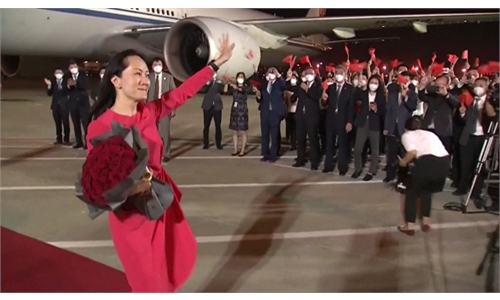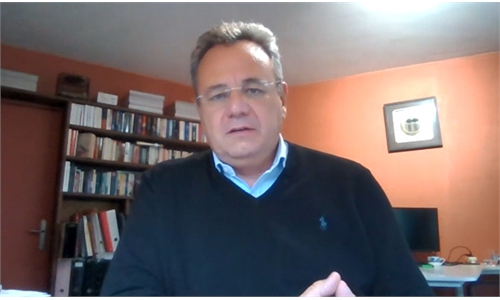Editor's Note:
Meng Wanzhou, chief financial officer of Huawei, recently signed a deferred prosecution agreement with the US and returned to China after being detained in Canada for over 1,000 days. Meng's story reminds many of a similar incident that occurred years ago when the US used its long-armed jurisdiction powers to strike down a senior executive from the French energy and transport company Alstom. Former Alstom executive Frederic Pierucci, who told this story in his book titled Le Piège Américain (The American Trap), talked with the Global Times (GT) reporter Chen Qingqing in the latest interview, sharing his thought on the Meng incident and its significance, especially concerning counteracting the US' use of its legal system to wage an economic war.

Frederic Pierucci
GT: What was your first reaction when you heard about Meng Wanzhou's deal with the US Department of Justice (DOJ) and that she could finally return to China? Was the result within your expectation? How did you feel about that?
Pierucci: When I learned about it, I was in Paris and someone called me and asked if I had seen the news. At the beginning the deferred prosecution agreement (DPA) had not yet been signed. When I heard that there would be a DPA to be signed, I was quite surprised and a little worried because nothing is done until it's done. So I waited until it had been done and downloaded the DPA from the internet to see it with my own eyes, because I couldn't believe that it was happening.
For me, it was a big surprise. The agreement is unique, which is really a very special deal that has been made.
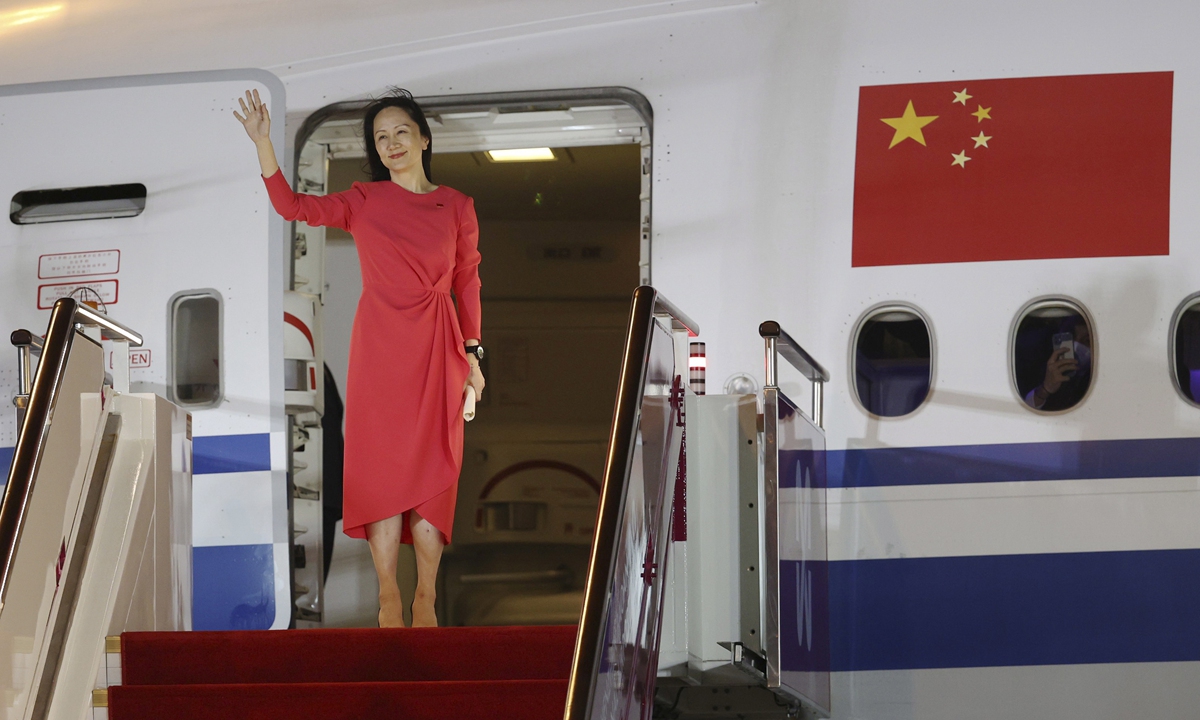
Huawei CFO Meng Wanzhou waves as she steps out of a plane upon arrival following her release, in Shenzhen, South China's Guangdong Province on September 25. Photo: IC
GT: Why do you call it "the unique deal"?
Pierucci: Because usually when an individual is basically under investigation or indicted by the US, the prosecution from the DOJ does not offer the alternative of a DPA with the person who is being indicted. It's either the person goes to trial and wins or loses. Or they make the person sign a guilty plea. So it's very unusual for them to offer a physical person to sign a DPA where the person does not have to admit guilt, not a plea agreement.
In fact, this kind of DPA usually is used for companies, not for individuals. So it's very unique.
GT: Although Meng admitted that she misled the global financial institution, she did not pay a hefty fine or plead guilty, which some legal experts consider a good result. What's your thought on that? Do you think it's a good result for Meng? Will Huawei face more challenges in future lawsuits in the US?
Pierucci: It's an excellent result for Meng, because in these kinds of DPAs, you admit to some stipulated facts at the same time. The person and the prosecutor agreed that the person did not commit any federal state or local crime.
In the case of Huawei, it's much better for Huawei that Meng signed a DPA rather than signing a plea agreement. Nobody can predict what will happen now in the case against Huawei. But this does not strengthen the DOJ. This is really much more to do with a prosecution against Huawei as it could have been much worse. So it's a good result.
While the statement of fact could be used against Huawei, and that's what they probably will try to do, I think it's not a surprise that Huawei is facing a big battle in the US but it could have been much worse for Huawei if Meng had signed a plea agreement.
GT: In your book The American Trap, your story indeed exposed the secret economic war that the US has tried to wage against foreign entities and individuals. Do you think there are similarities and differences between your story and that of Meng, especially the results you reached as you think it's an unfair sentence in your case? Could you tell us what you have learned from your past experiences?
Pierucci: It's clear that the US has been using its along-arm jurisdiction for quite a long time by targeting specific companies in specific sectors, which are strategic sectors most of the time. They started with Toshiba in the 80s and 90s, then Alstom, then Huawei and so on. You see a similarity of cases where you have the US jurisdiction being applied to foreign companies in order to achieve an economic goal.
The difference between, obviously, my case and that of Meng is that I was arrested while I was in the US. Therefore, I didn't have the chance to really fight back before I was incarcerated. The fact that she was arrested in Canada made a huge difference. The other huge difference is that she had the full support of Huawei and the Chinese government as they understood very rapidly this was not a legal case as usual. It was a very specific legal case. I think the Chinese government and Huawei understood very rapidly, this was part of an economic war.
On my side, the case dated back in 2013 and 2014. At that time, at least in Europe, we didn't know too much about this use of the legal system to target specific companies. So I didn't get support from my company nor the support of the French government. Now, I think the world understands how this works and we can react much better.
I think the case of Huawei is going to hopefully start to slow down the US' long-arm jurisdiction practices. For the first time, a country is really standing up and is keeping some of its citizens from US jails and protecting its companies in such a way. Maybe it's not going to stop the US, but at least it's a victory.
GT: Do you think such a victory will inspire other countries or companies to stand up in fighting against the US' long-arm jurisdiction in the future?
Pierucci: Yes, some countries have started to react. I think the first country that really reacted was the UK where they enacted their own anti-corruption law in 2010 - the UK Bribery Act 2010 - to also counteract the extraordinary application of the US law. As the US went after one of the biggest British companies, British Aerospace, and made it pay for millions in fines, the British understood this was used to target their companies, so they enacted their own law to protect them.
In France, in 2016, following the Alstom case, we enacted the French anti-corruption law, called the Sapin II, to protect French companies. In China, after the ZTE and Huawei cases, China started to enact some new laws including the export control law and a countersanctions law. Different countries started to react to such extraterritorial reaches [of US laws.] Russia also started to react.
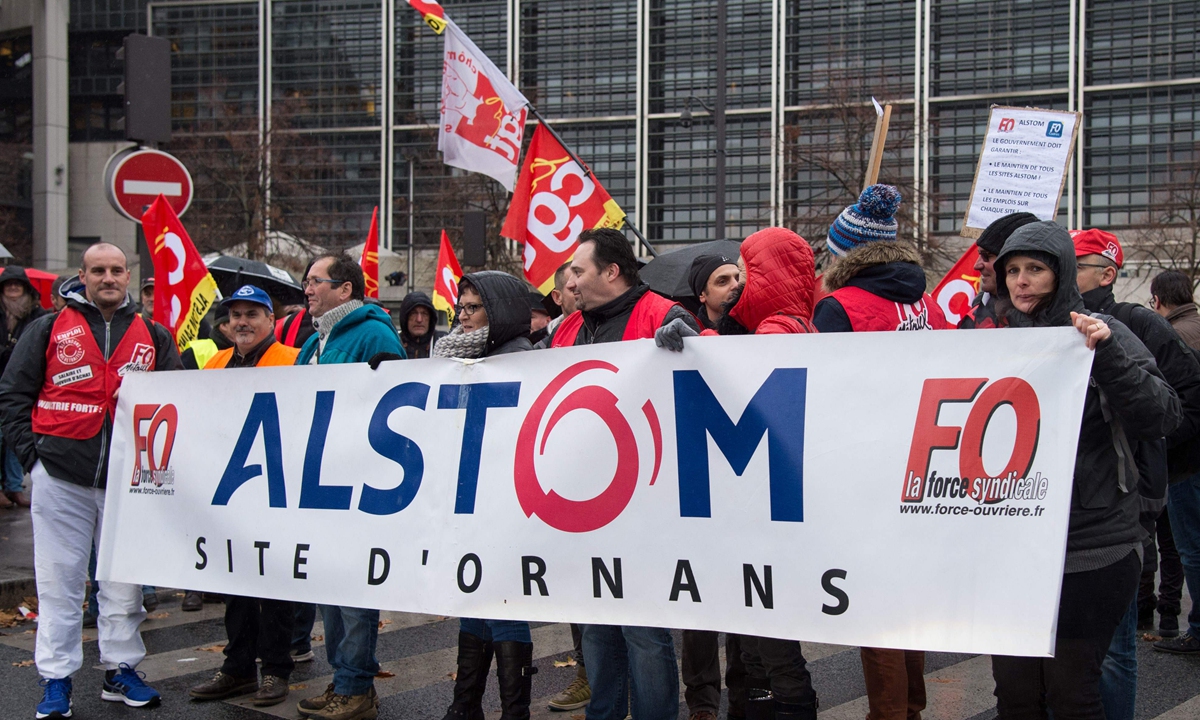
Alstom employees protest in front of the Economy Ministry in Paris, to call for measures to preserve jobs in France on November 30, 2017. Photo: VCG
GT: You mentioned that in a recent interview with another Chinese media outlet, CGTN, that this was the first time that a country's will has successfully fought back against the long-arm jurisdiction of the US, but you are not as lucky as Meng. Could you tell us what your company and your country could have done more for you at that time?
Pierucci: It happened in 2013, and I think the company and the government were not ready to stand up against the US. And they just saw it as a legal case instead of looking at it as an economic case. They could have done what they later did after the Sapin II was enacted in France.
To protect French companies, there are two examples. One was with the Société Générale and the other with Airbus. We are able to settle those cases in France, mainly, and the fines being paid in France mainly and nobody has been arrested. But they took Alstom in part before we were able to react in such way.
GT: Some countries, such as Canada and Mexico, have introduced legislation to block the "long-arm jurisdiction" of the US, prohibiting their nationals from submitting to US laws and punishing companies and personnel who violate the "blocking laws." Do you think Europe should be more like those countries? Is it fair that the US - a country advocating for the free market - competes with its rivals while at the same time it could rule others by its own so-called law?
Pierucci: Of course it's not fair. Looking back in the history, when a country had a military supremacy, it would try to impose its laws to the rest of the world, for example, the Romans imposed their laws when they invaded the others, and the Napoleon imposed French law in all the territories that he concurred, while the British did the same. Now it's up to us to accept it or not. Now countries are reacting to this.
It's nice to establish a law, but it's much better if the law would be applied. For instance, in France, we have blocking statute law which also prohibits French companies from transferring information to another foreign jurisdiction in case they are under investigation. The problem is that the law had not been applied and therefore, because there were no real punishments for companies doing it. Companies prefer to transfer documents outside of France to the US in the hope of lowering the fines that they will pay in the US.
Since they were not paying a fine in France for infringing a French blocking law, culpability was not a problem. It's nice that Mexico, Canada, France, and other countries, and now China, have also set up a kind of blocking law. Now let's see which country really applies it.
GT: While it's the first time that China has fought against the US' long-arm jurisdiction and gained a victory so far, do you think the legal and economic war between China and the US has already started? What do we need to do as a government, company, or individual to win this war?
Pierucci: Now the US and China are at economic war like the US was at war with Japan in the 80s and 90s, and the US had been at war with the Europe before. One of the issues is that if you don't show that you are strong, they will not consider you in a positive way. Therefore, they will continue to do what the US has been doing.
Only if you take strong measures and sometimes retaliatory measures, only then shall they begin to back off.
For instance, in Europe, in the 80s, the US had started to attack French companies on antitrust issues. Therefore, they put a lot of fines onto the French and European companies on antitrust issues. At that time, Europe also reacted and put a lot of fines on US companies for antitrust as well. And then, there was an equilibrium which created itself.
You need to show that you are strong because otherwise you're not going to be considered as a worthy opponent. And then you are going to be laminated. So you have to react with strength, obviously.
GT: Did you see China changing its way of interacting with the US in recent years? Have you seen more in terms of a reaction or countermeasures from the Chinese side in recent years, especially since the trade war started?
Pierucci: Yes, of course. It's been like playing ping pong between the two countries. From 2020 to 2021, China enacted different decrees and laws to basically protect its economic interests. The legal framework is currently being built in China to counteract this.
Regarding Europe, the problem is that Europe is not really one, with 27 countries having different interests. Some are much closer to the US while some want a more independent Europe from a military and economic point of view. For example, now we started to discuss protecting data for companies, avoiding the transfer of data from Europe to the US. We have a new decree called Schrems II which prohibits the transfer of personal data to the US, and we started to react but it will take time.
But we need member countries to agree before enacting the laws, and the US is very good at playing one against the other in Europe and therefore it takes more time.
GT: Do you think Europe is also in a certain kind of legal or economic war with the US? Do you think the European multinational companies are facing the same challenges as the Chinese firms do and what needs to be done in fighting such unilateral moves?
Pierucci: It's clear that some actions are targeting specific technologies but some are not targeting technologies but some companies and some banks. For example, the biggest fine that was paid in Europe was paid by the French bank BNP Paribas for export control issues similar to the Huawei case by paying $8.9 billion. In fact, Europe was hit before China by the extraterritoriality of the US law on sanctions, embargos, and export control and on corruption cases.
What you see in China could be only the beginning of the problems, as the US has enacted decrees that FBI agents now need to focus on Chinese company competing against American companies for infringement of the Foreign Corrupt Practices Act, so you could expect more cases against Chinese companies.
GT: There's another recent book by a French entrepreneur, Marc Lassus, published in Chinese that reveals how the US security services persecuted him and seized control of his tech firm. But he said he hesitated to write such a book, worried about US retaliation, fighting alone (without state support). Did you hesitate before publishing the book The American Trap ? Did you later suffer retaliation from relevant US authorities?
Pierucci: I know Lassus very well and he's a good friend of mine, and his story is similar to mine. In fact, he mentioned that he waited for me to write the book so that he could feel free to write his book many times. His story happened about 20 years ago. And there's nothing new, it's just China has been hurt after us in Europe on those issues.
There's a risk in writing and there's a risk in not writing. I felt that duty to put it in my writing, because I want to protect French companies against this. I also want to warn employees of large corporations, because what happened to me could happen to others. And it fact, it happens all the time, In many countries, there are a lot of "Meng Wanzhou"s and "Frederic Pierucci"s in US prisons. I published the book as soon as I came out of prison.
GT: For Chinese companies and also for European companies, what should they do during this prolonged legal and economic war with the US? What is your suggestion?
Pierucci: I set up my own constituent company in 2015 after this happened, because I felt that the number one thing to do in companies is the need to put processes in place to minimize this kind of risk.
You need to put anti-corruption processes in place in the company, to write down the code of conduct, to write processes, appoint consultants and agents, as well as intermediaries. You need to do a risk map to identify where you're potentially at risk of corruption, either interpersonal or company-client. You need to put a kind of whistle blowing outline inside your company to detect signals and you need to carry out due diligence on your partners because if your partner, which means your distributors or agents, pay a bribe that you benefit from, you are also responsible. So you need to put all those policies in place inside the company and to protect management.
That's what we're doing. Basically, we are doing it on anti-corruption. We're doing it on export control and trade compliance. It's important to have a set of internal rules to minimize service.
If something were to happen, you can always defend yourself by saying I did all I could do to prevent it inside the company by implementing all the processes and policies. It's also important to train the management and staff who are the most exposed to those risks, which is what we could do at the company level. At the country level, you need to do exactly what France has been doing or China is doing now by setting up your own set of laws to protect the companies as well.
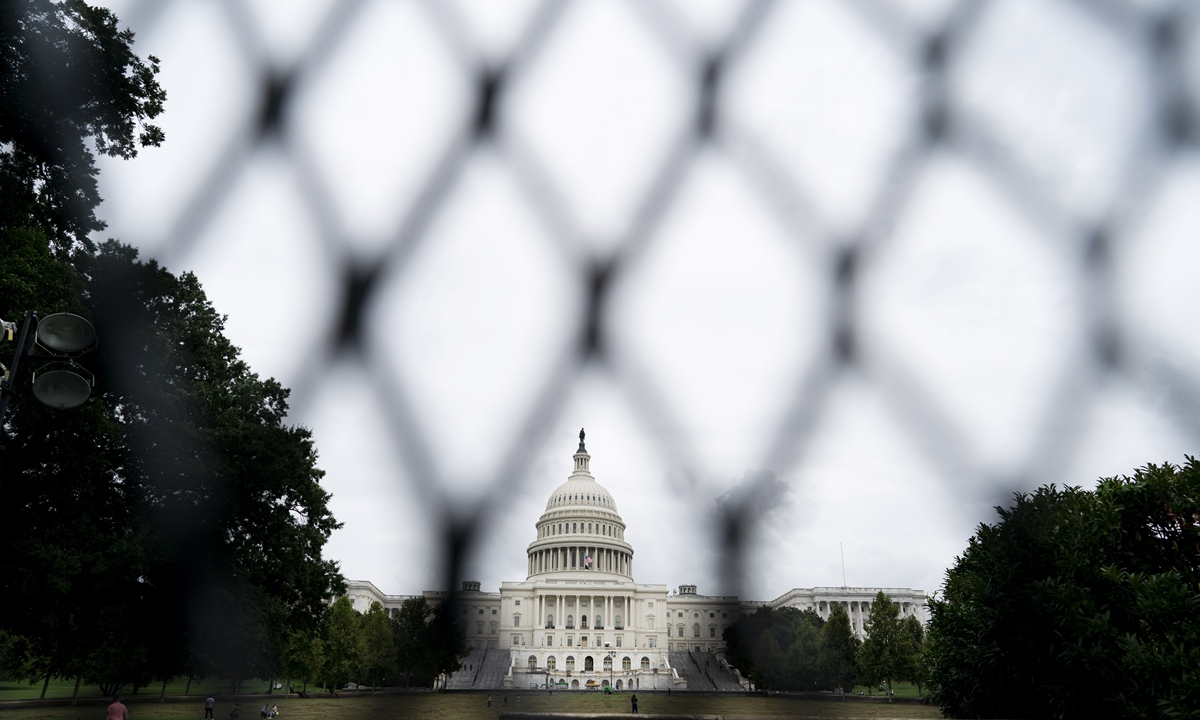
A view of the US Capitol Building. Photo: IC
GT: After the Meng Wanzhou incident, will similar incidents happen again? Will there be another Meng Wanzhou in China?
Pierucci: I don't know. There may be some less high profile people who could be prosecuted because Huawei is not the only company to have been targeted. Every year, there are new companies, maybe smaller ones and with less high profile cases, which are under scrutiny or indicted or have to face this kind of problem. So this is not going to stop. What could stop this is to minimize it if the country puts in place laws and tries the cases inside your own country. Unlike what was done in France with the cases of Société Générale and Airbus. If China treats those cases in the country, companies will not be subject to US jurisdiction. It is going to be a different situation.
GT: If you were asked to use one word to describe the practice of the US, which word would you choose?
Pierucci: Very pragmatic. The US is the superpower, and they're defending their interest and they're using all the means to defend their interests. The US is not going to change whether it's Democrats or Republicans. They are always going to fight for the economic interests of the US.


